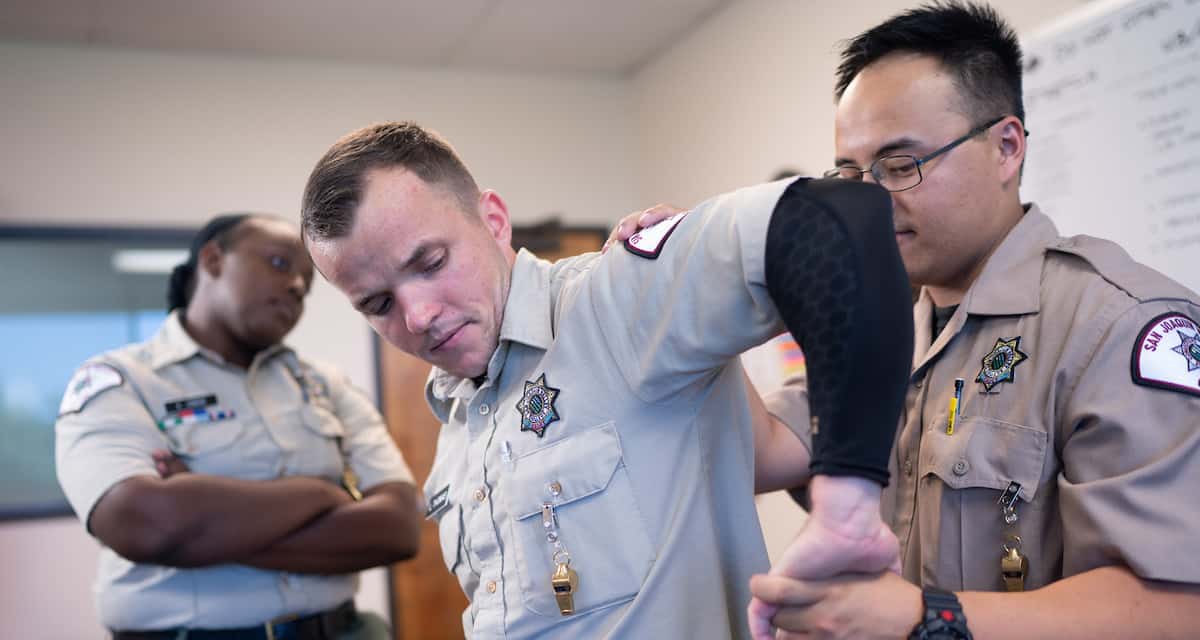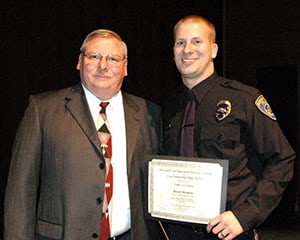What are the benefits of earning an Associate of Science degree in Criminal Justice: Corrections?

Are you considering a career as a Detention or Correctional Officer?
It can be a highly competitive field, and the hiring process can be comprehensive and lengthy.
During that time, what can you do to position yourself as a more viable, appealing candidate to prospective employers?
For Destiny Carter, 23, earning her Associate of Science degree in Criminal Justice: Corrections from San Joaquin Valley College provided the education, training, and experience she needed to excel during a rigorous employment process.
Carter graduated from SJVC’s Temecula campus—one of 10 SJVC campuses offering the accelerated, in as few as 14-month Criminal Justice: Corrections AS degree—in July, 2019.
Less than a month later, she was hired by the Arizona Department of Corrections and moved 350 miles from her home in Hemet, CA to begin the department’s training academy near Phoenix. She’s now employed full time as a Correction Officer 2 at the Arizona State Prison Complex-Lewis in Buckeye.
“Everything I experienced throughout my program at SJVC prepared me to be a better candidate,” says Carter. “The education, the physical training, and the various written and physical tests I took throughout the program all helped lay a solid foundation that provided a real sense of confidence. I visited a border control facility, a prison, a jail, and a youth detention program. I also learned about evidence collection and preservation. I learned how to handle weapons, how to defend myself, and how to diffuse potentially volatile situations.”
By the time she graduated, Carter says she knew she could—and would—excel in the field of corrections.
“I felt like I had a solid advantage,” she recalls. “I think the focus, commitment, and self-confidence I developed while earning my degree really helped me interview well. I knew what to expect throughout the process. In fact, the written and physical tests we practiced in class were even more demanding than the ones required to get the job.”
Kent Chivington, program director of the Criminal Justice: Corrections department at the San Joaquin Valley College campus in Temecula, says Carter’s experience is not unique.
“Our program is designed to prepare students for successful careers in corrections,” says Chivington. “Associate degrees are required by some agencies to apply for their promotions. It will most definitely set them apart from other applicants. We place a strong emphasis on ethics, discipline, education, and training. During the process of earning their AS degree, students also develop valuable experience and analytical skills that can help in the job application process.”
Chivington says the program provides a solid foundation that serves students well.
“Our program includes instruction in criminal law, evidence collection and preservation, report writing, institutional corrections, physical agility training, defensive tactics, and weaponless defense,” Chivington explains. “During the program, students also learn arrest and control techniques, courtroom procedures, CPR and first aid, and firearms* use.”
Graduates earn their Associate of Science degree in Criminal Justice: Corrections and also earn certification in Standards and Training for Corrections (STC) Adult Core Academy, which includes 8-hour Baton training. Graduates also receive Bureau of Security and Investigative Services (BSIS) certified training in Powers to Arrest, Weapons of Mass Destruction, Firearms*, Baton, Chemical Agents, Public Relations, Observations and Documentation, Communications and its Significance, and Liability and Legal Aspects, resulting in (BSIS) Security Guard card and (BSIS) Security Guard Exposed Weapons permits.* Students also earn certification in CPR/First Aid.
The program is STC certified to provide instruction by the Board of State and Community Corrections (BSCC)/Standards & Training for Corrections (STC) and the Bureau of Security and Investigative Service (BSIS).
For more information go to our Criminal Justice: Corrections Program Page
* Effective January 1, 2020, BSIS Exposed Firearms Permits may only be issued to applicants who are 21 years of age or older. Individuals who do not meet the new age requirement will be provided alternate training during the firearm sessions, and are welcome to pursue the certification after they meet the age requirement.
Learn More About A Career In Criminal Justice: Corrections
Criminal Justice: Corrections can open doors to work in private, state, federal prisons or local jails as well as in private security in California. Learn how to join this exciting career and why you should pursue a correctional officer degree.
You might also like
More stories about
Request Information
All fields using an asterik (*) are required.


